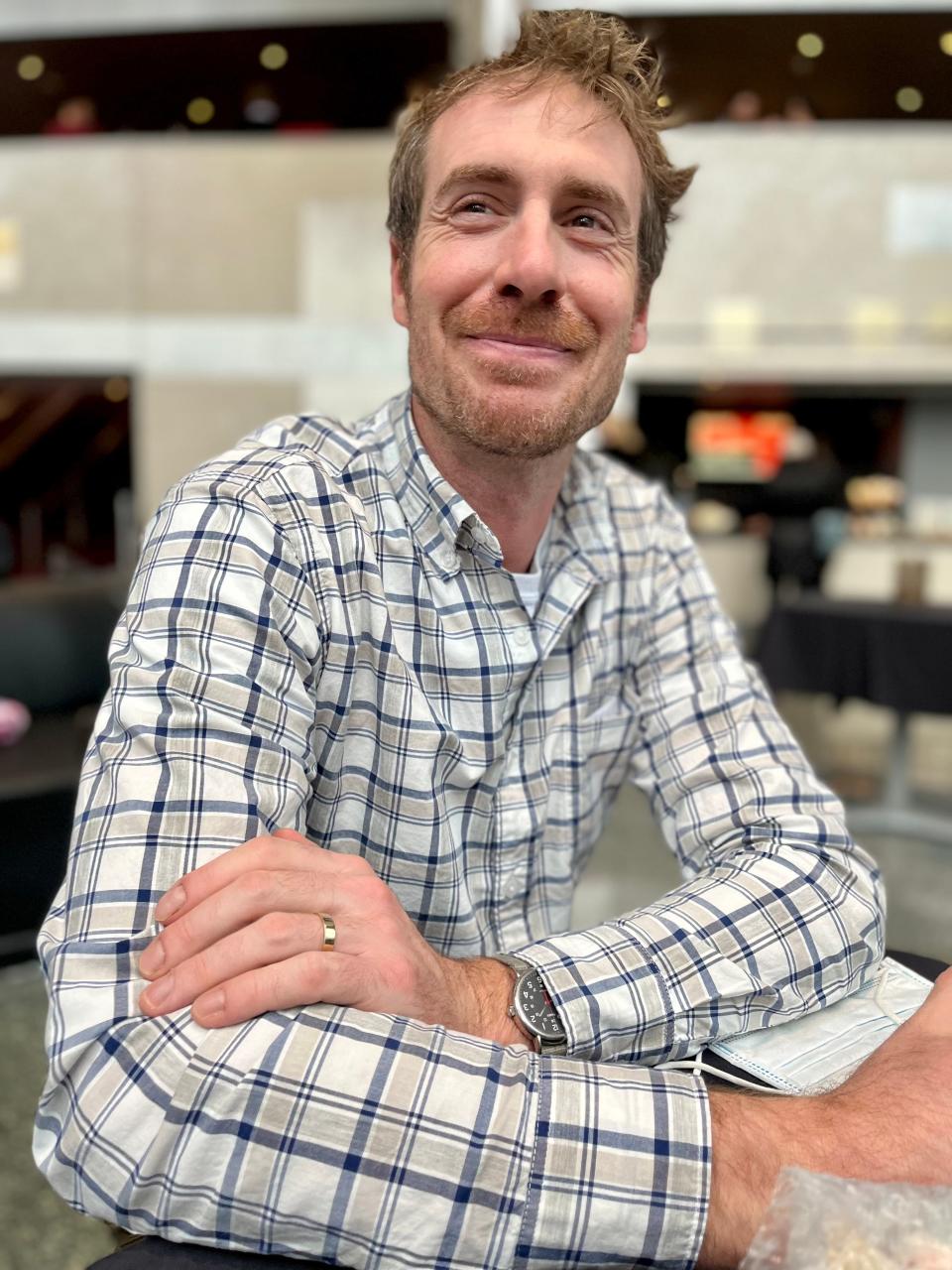Meet the FLCC prof who will help you explore the fun of wine
GENEVA, NY - After completing his physics degree, Michael Penn decided he didn't want to be a physicist or an engineer.
Wine, though - that's something Penn, who grew up on a small island in Puget Sound near Seattle, Washington, could get into. So he landed a job in Hunter Valley, Australia, where he worked for an organic winemaker who grew his own grapes and made wine next door to his house.
"After that experience, I realized I wanted to work with the Earth and make something that people enjoyed and that created community," Penn said in an email. "Making wine does all of those."
Penn developed and will instruct the courses, Wines of the World, beginning Jan. 26, and Wines of Europe in the fall at Finger Lakes Community College. He knows what he's talking about.
Besides working in an Australian vineyard, Penn learned the viticulture ropes in Washington, California, New Zealand and two regions in France. He also completed two degrees in viticulture and enology in those years before settling down in the town of Santa Rosa, California, where he began working for an old winemaker in the Napa Valley who specialized in growing and making Zinfandel.

While the job at times was amazing, he said, a low point came in 2020 when a fire started next to the property and the smoke destroyed the entire crop of grapes that year, just as it was ready to be harvested.
Devastating, he said, to say the least. So Penn, who by that time had moved up to head winemaker, his wife and young daughter made a different career move, to New York.
What follows is a question-and-answer session with Penn about wine and his upcoming classes. Answers have been lightly edited.
Q: What will students learn from this class?
Penn: The class will focus on three main topics, while circumnavigating the globe through its wine regions and wine. We will "introduce" what wine is and how it is made ... but only just enough to whet students' curiosity. If they want to learn more about how wine is made, they can take more classes.
Secondly, we will learn about how to taste wine, and what kind of aromas and flavors can be found in a glass of wine, and how to effectively communicate aromas and flavors to others.
Thirdly, we will learn the geography of wine; how climate, soil and geographic features affect the suitability of growing grapes and the flavors found in the wine.
Q: Why do you feel it's important for people to take a course like this?
Penn: Wine is a great thing to learn about. Wine can be enjoyed by absolutely anyone who enjoys eating good food and drinking alcohol with their meal. It is something that brings friends, families, and even strangers together and kindles conversation and community.
Wine is essentially apolitical, so it is usually a safe topic for holiday meals when there are topics that might be too personal or emotional to find common ground. Our current culture of wine is a reflection and product of at least 8,000 years of history and culture, and people arguing and celebrating.
And finally, wine comes from a vineyard. A particular place on Earth where some people decided it was a good place to put some sticks in the ground and see what happens. Not all places on this Earth give the same results, and because of this, certain regions and vineyards are distinct and worth preserving. Certain parts of this Earth are more special and unique than others.
And finally finally, making wine is an art. When done by people who passionately believe in doing a good job while using the best techniques and a lot of hard work, something truly unique and profound can be experienced and shared. As soon as you start to peel these layers of the onion off, wine is an infinitely complex topic that one can spend a lifetime learning about, with great joy and curiosity.
Q: What can you learn about a region and its people from the wines produced?
Penn: The wines that are produced in a region are a reflection of tried-and-true, and often stubborn, efforts and rewards of all the people that have come before. For example, the grape varieties that are grown and produced in a region will stick around, and grow in abundance, if the grapevine successfully survives year after year, and behaves in a helpful way based on the climate and the soil.
Essential for a great wine region is a climate that allows a grape to ripen with enough heat and rainfall to make delicious flavors, acidity and tannins, but without too much heat and rainfall that the grape ripens without complexity. So, by learning about the successful wines of a region, you can begin to understand why they are successful, and why they might be successful somewhere else that is similar, like here in the Finger Lakes. And through history and culture, we can learn how the great winemaking nations have affected each other through conquest, commerce, migration and sharing of ideas. We see this historically, for example, in southern France, where many of the grape cultivars come from Spain, and where the complex history of the Kingdom of Aragon, the dual papacy, the Albigensian crusades, and other historic factors that led to migrations of peoples and grape cultivars shaped what is grown and produced today.
Q: What stories do Finger Lakes wines share?
Penn: We can apply the same template here, and begin to tell a great story of the uniqueness of the Finger Lakes, and why this is a bustling and exciting place to make and drink wine. The early winemakers planted Concord, Catawba, Niagara and other cultivars that were naturally found here on the East Coast, and that had genetic predisposition to survive the harsh winters and humid summers.

After a century of grape growing and sorting through the various sites in the Finger Lakes and Hudson Valley, they discovered that some sites were warmer with better aspect and soils, and more valuable for wine. The next chapter involved winemakers who had emigrated from France (Charles Fournier and others) and Ukraine (Dr. Konstantin Frank) and who were determined to plant vinifera varieties like Riesling and Chardonnay, because they were stubborn enough to think it could be done, and because they valued the improved flavor of vinifera wine.
I'm not here to tell students that native or hybrid varieties are better or worse than classic vinifera varieties, but I am here to share the story of their successes and failures, as well as the challenges and the triumphs of New York winegrowing. I am still too new to understand exactly where New York is in its development as a wine region, but I can say that there seems to be a renaissance or at least a very exciting transition taking place. A new generation of producers and consumers are interested in trying new things, and there is a lot of excitement as well as an opportunity for people to put some sticks in the ground and try their hand at this endeavor that dates back at least eight milleniums.
Q: Do you find some people are intimidated by "wine tasting" and does a class like this help with that?
Penn: Absolutely, and that is one of the things I hope to help students break down. My understanding is that the intimidating part is related to people's lack of knowledge and confidence on the topic, and the experience of having to taste wine with others, friends or family, who think they know a lot and use that confidence to make others feel less "initiated."
Often those people who think they know a lot, don't know a lot, and ruin the experience for others. The truth is that wine is fun, and it's fun to learn about. Secondly, the very purpose of sharing and enjoying wine with others is to connect with them and enjoy the experience, not to create a hierarchy of who knows more about the cru of Bordeaux or what the great vintages of Champagne are.
So yes, I hope this class helps with that.
To take the class
Wines of the World is a 15-week, one-credit classrunning 4:30 to 6:20 p.m. Thursdays – beginning Jan. 26 – at the Finger Lakes Community College Viticulture and Wine Center off Pre-emption Road in Geneva.
The course will survey the geographic, cultural and historical context of the wine regions of America, Africa, Australia and Asia. Students will taste four to eight wines per class and learn an analytical framework and methodology to evaluate, describe, record and communicate the wine quality and character to their classmates.
Costs are $213 for tuition and $100 for fees. Both spring and fall classes will have an enrollment cap of 15. The general public can sign up for most FLCC classes without enrolling in a degree or certificate program. Information on taking individual courses is available at flcc.edu/takeaclass or by calling 585-785-1000.
This article originally appeared on Rochester Democrat and Chronicle: Meet Michael Penn, the FLCC prof who will help you appreciate wine
